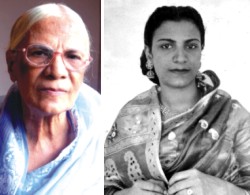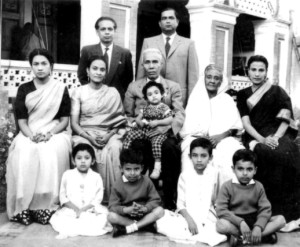| Personality
A Pioneering Voice
Andrew Morris
 |
Malka Parveen Banu now (left) and then (right). Photo: Andrew Morris |
It's 27th June 1946. The radio lights up, crackles, and families all over Dacca lean in to hear the latest broadcast of All India Radio, twisting the knob to get the clearest possible reception, closing their eyes as the music emerges. And from inside this magic box comes a sinuous voice, strong and confident, handling the twists and turns of a Tagore song with ease.
The radio comes alive every day with the famous Hindu singers who are already household names across the subcontinent. But this is no ordinary singing performance. What is unusual today is that the voice belongs to Malka Parveen Banu, and that she is the second ever Muslim woman to sing on All India Radio. Extraordinarily, it's Malka's elder sister Leila who was the first, and who was renowned for public performances not only in the local town hall but overseas as well, touring as far afield as Iran.
But now a full sixty years later, It's Malka who sits in front of me in her simply-furnished apartment in Banani DOHS, recounting just how it was that her sister and she came to be such pioneers. She is graceful and elegant, her features still strong. Pictures taken back in the late 40s show her as a handsome woman, self-assuredly meeting the camera with a steady gaze.
In an age where the music business is thriving in Dhaka as never before, complete with stars, local radio stations, loads of hype, and glitzy launches, it's worth listening to this gentle woman whose very appearance on the radio in those days was a brave and unusual step.
 |
The Taifoor family (Syed Taifur seated centre, Malka seated right). |
This was a time, Malka tells me, when Muslim women would only enter the street in full burkhas, and when the only education they received would be at home at the hands of private female tutors. Such detail can only increase your admiration for the stance taken by the family patriarch Syed Muhammed Taifoor, who had a very different vision of the future his girls would experience.
A dapper man about town, Taifoor's job as the Registrar of Calcutta under the Raj did not prevent him being an amateur historian of note, a writer (I have his book “Glimpses of Old Dhaka” in my study) and a collector of rare coins and artefacts eventually bequeathed to the Dhaka Museum as the Taifoor Collection. He was self-taught and broad-minded, belonging to a liberal family who owned land going back to the time of the Emperor Jahangir. In the early days following Partition, he was a firm supporter of Pakistan, but then became gradually disillusioned and an advocate of a Free Bangladesh. He lived to see his dream realised, dying in 1972, one year after Independence.
Apart from his wide-ranging interests, he quite clearly had grand plans for his children. The very names he gave them sounded exotic in those conservative times. Malka's eldest sister, who went on to become a Commissioner for the Commission for Racial Equality in the UK, was Lulu Bilquis Banu and her elder sister was Leila Arjumand Banu. In the liberal atmosphere fostered by Taifoor in Kawser House, located on the edge of the Old Town, (of which nothing remains today except the family cemetery), his daughters wore saris when they left the house, mixed freely with the guests who attended cultural salon evenings, and even, extraordinarily, rode their bicycles through the streets around Siddique Bazaar. Above all though, he ensured they went on to University, and although Malka's studies were cut short by a typhoid attack, her sisters went on to gain MAs in Persian and Geography.
It's a lost, evocative world, but to meet Malka and hear these tales is to be transported back, especially when, on my request, she once more begins to sing. Her voice fills the air, smaller now but still lilting and assured, the notes cascading like rain as the evening gathers around us, and the darkness spreads slowly across the room.
Copyright (R) thedailystar.net 2007 |
